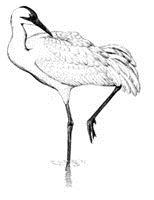North American Crane Working Group

Proceedings of the North American Crane Workshop
Date of this Version
1992
Document Type
Article
Citation
Lewis, J.C. The contingency plan for federal-state cooperative protection of whooping cranes. In: Wood D. A., ed. 1992. Proceedings 1988 North American Crane Workshop, Feb. 22–24, 1988. Lake Wales, Florida (Tallahassee, FL: State of Florida Game and Fresh Water Fish Commission Nongame Wildlife Program Technical Report #12, 1992), pp. 295-300.
Abstract
A "Contingency Plan for Federal-State Cooperative Protection of Whooping Cranes" was developed in 1985 to protect migrating whooping cranes (Grus americana). Thirteen states and the U.s. Fish and Wildlife Service implemented the plan in summer 1985. One state and one feq,eral employee, and alternates, are appointed as the "key contact" individuals within each state. Reports of sightings of whooping cranes are forwarded to these key contacts and they coordinate the response to sightings. An important part of the plan is education activities designed to increase the public's ability to identify whooping cranes and to encourage the reporting of sightings during migration. Responses to sightings vary with the associated circumstances. Whooping cranes have been hazed from fields where they were feeding on pesticide-treated corn seed. Hunting activities have been temporarily closed in 4 states for several square kilometers around cranes until they continued their migration. Since the plan was implemented, there has been a 14% increase in confirmed sighting reports, a 29% reduction in losses of white-plumaged birds, and a statistically significant (p
Included in
Behavior and Ethology Commons, Biodiversity Commons, Ornithology Commons, Population Biology Commons, Terrestrial and Aquatic Ecology Commons


Comments
Used by permission of the North American Crane Working Group.